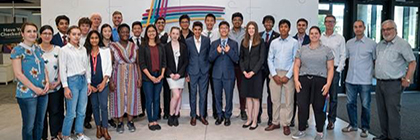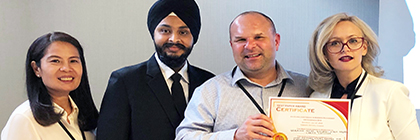 All full-time undergraduate and graduate students at York University are eligible to receive a discounted fare of up to 22.5 per cent OFF the regular adult fare when they ride GO Transit.
All full-time undergraduate and graduate students at York University are eligible to receive a discounted fare of up to 22.5 per cent OFF the regular adult fare when they ride GO Transit.
To receive the discount, students must have an activated PRESTO™ fare card and a GO Transit Student Identification (ID) Card in addition to their YU-card.
The GO Transit Student ID Cards are valid for the school year, but to be eligible, students must be enrolled full-time in both the fall and winter semesters. (Students enrolled in certificate programs are not eligible for the GO Transit Student ID Card.) There is no cost for the GO Transit Student Identification Card.
Applying for the card is easy and can be completed online. During the application process, students have the option of receiving their card by mail or they can pick up their cards at the Parking & Transportation Services Offices on the Keele and Glendon campuses. (For the Keele Campus office, go to the William Small Centre. Glendon students should visit the Glendon Greenhouse at the Glendon Campus).
Students who take GO Buses to York University’s Keele Campus will be dropped off at the Highway 407 Station. From there, they must take the subway to either Pioneer Village Station or York University Station to access the Keele Campus. Students will be required to pay the TTC fare. Currently GO Transit offers a discounted double fare (DDF) with the TTC. Students will pay $1.50 instead of the full $3 when they transfer from GO Transit buses to the subway and use the PRESTO™ card.
Two subway stations, the Pioneer Village Station and the York University Station, serve as transit hubs for the Keele Campus. York region buses, YRT/VIVA operate out of the Pioneer Village Station on the north side of Steeles Avenue. From there, York University students can connect to the TTC subway to the York University Station, or cross Steeles Avenue to access the Keele Campus.
Brampton Züm buses service the Keele Campus from Ian Macdonald Blvd.
York University will continue to share updates received from the various transit service providers with the community. For more information, visit the Transportation website.

























